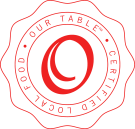- U-PICK BLUES ON SALE
- CHECK OUT OUR NEW COFFEE CLOSET!
- SEPT FARM DINNER TKTS AVAILABLE NOW!

For humans, local adaptation is not work for a few financiers and a few intellectual and political hotshots. This is work for everybody, requiring everybody’s intelligence. It is work inherently democratic.
What must we do?
First, we must not work or think on a heroic scale. In our age of global industrialism, heroes too lightly risk the lives of people, places and things they do not see. We must work on a scale proper to our limited abilities. We must not break things we cannot fix. There is no justification, ever, for permanent ecological damage. If this imposes the verdict of guilt upon us all, so be it.
Second, we must abandon the homeopathic delusion that the damages done by industrialization can be corrected by more industrialization.
Third, we must quit solving our problems by “moving on". We must try to stay put and to learn where we are geographically, historically and ecologically.
Fourth, we must learn, if we can, the sources and costs of our own economic lives.
Fifth, we must give up the notion that we are too good to do our own work and clean up our own messes. It is not acceptable for this work to be done for us by wage slavery or by enslaving nature.
Sixth, by way of correction, we must make locally adapted economies, based on local nature, local sunlight, local intelligence and local work.
Seventh, we must understand that these measures are radical. They go to the root of our problem. They cannot be performed for us by any expert, political leader or corporation.
This is an agenda that may be undertaken by ordinary citizens at any time, on their own initiative. In fact, it describes an effort already undertaken all over the world by many people. It defines also the expectation that citizens who, by their gifts, are exceptional will not shirk the most humble service.
A REGIONAL COOPERATIVE CREATING HANDCRAFTED, THOUGHTFUL AND DELICIOUS FOOD
© Our Table Cooperative, 2016